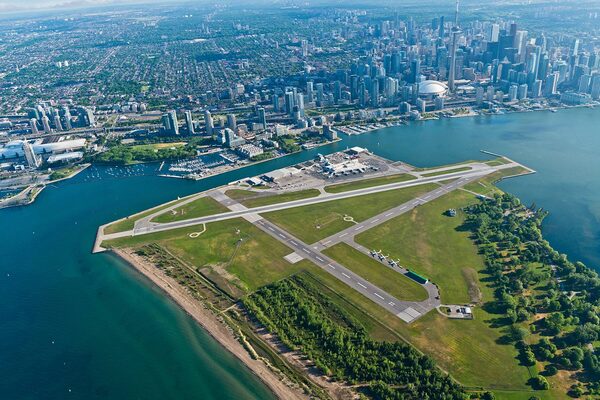
Toronto’s Billy Bishop airport makes a significant contribution to the city’s economy.The Globe and Mail
In 2006, Billy Bishop Toronto City Airport served just 22,300 travellers. By the end of last year, the number had increased to 2.7 million, a staggering growth rate by any measure and a massive challenge and opportunity for PortsToronto, owner and operator of what is now Canada's ninth busiest airport.
Geoffrey Wilson, PortsToronto CEO, admits that the rapid passenger influx was not without its growing pains. It called for careful management, a significant investment in infrastructure and the development of clear policies to mitigate the impact of the airport so that it could integrate into the community.
Billy Bishop Airport's location is unique among Canada's busiest airports. Being only 3 kilometres from downtown Toronto and a close neighbour of the condo developments and recreational areas that have emerged on the waterfront since the airport was opened in 1939, noise abatement is a top priority.
For example, says Mr. Wilson, infrastructure investments have included a sound barrier and a recently opened ground run-up enclosure – only the second of its kind in Canada – which dampens the noise emitted from engines undergoing testing after maintenance.
"Out of respect for our neighbours, we have also developed policies regarding how, when and where noise is generated, and we use 100 per cent Bullfrog Power green energy for all our operations to reduce our impact on the environment overall," he says.
The approach seems to be working. Complaints about noise have decreased year-over-year for the last five years, with 2016 recording a 38 per cent decline from the previous year. In 2017, the airport was recognized by Airports Council International for having the Best Noise Management Program in North America.
Airport representatives also meet every quarter with a community liaison committee made up of neighbourhood associations and local stakeholders to hear feedback and discuss areas for improvement.
"They properly hold us to account, and many of the improvements we have made has been because of the constructive dialogue at these meetings," adds Mr. Wilson.
Being so close to the city has sustainability benefits of its own; 40 per cent of passengers bike, walk or take transit to and from the airport, more than any other airport in North America, and once travellers arrive at the airport, they have access to facilities that have elevated Billy Bishop to the sixth best international airport in the world as judged by Conde Nast Traveler magazine.
"Basically, from curb to gate, we try to provide a friendly, efficient experience, which has come to be recognized by travellers as something special, and that's the secret to our success," says Mr. Wilson.
Growth has also brought significant economic benefits to the city and the region, accounting for more than $2.1-billion in economic output annually and supporting 6,500 jobs, including 1,960 directly associated with airport operations.
"But the airport also plays a role in the economic prosperity of the city by providing connectivity," says Mr. Wilson. "With connections to major markets in Canada and the U.S. such as New York, Boston, Washington, Ottawa and Montreal, the airport makes it easy to do business in and from Toronto."
The airport also serves as an important base for medevac air ambulance, charter flights, a flight school and personal aviation, which accounts for almost 50 per cent of its total movements.
Looking ahead, Mr. Wilson says in spite of Billy Bishop Airport being the most noise and capacity restricted major airport in North America, passenger numbers can continue to grow without upsetting the balance with the neighbourhood and over-stressing existing infrastructure.
He adds that 2018 will be a big year for the airport as airfield restoration is completed, a new terminal space opens to provide more seating and amenities for passengers, and work on a Master Plan update that continues to set the vision and strategy for the airport.
But the biggest challenge for Billy Bishop Airport is the pending expiration of the Tripartite Agreement in 2033, which is an operational and land-use contract between PortsToronto, Transport Canada and the City of Toronto.
"As we continue to invest in the airport and large-scale infrastructure, PortsToronto will need to secure financing and a longer amortization period to pay off debt," says Mr. Wilson. "As we get closer and closer to 2033, it is becoming increasingly difficult to secure financing, which makes it harder for us to make important investments and improvements. This issue needs to be responsibly addressed by all three parties to ensure that the airport can continue to benefit from investment and passengers can, in turn, benefit from the airport and its service offering."
Produced by Randall Anthony Communications for Globe Content Studio. The Globe's Editorial Department was not involved in its creation.